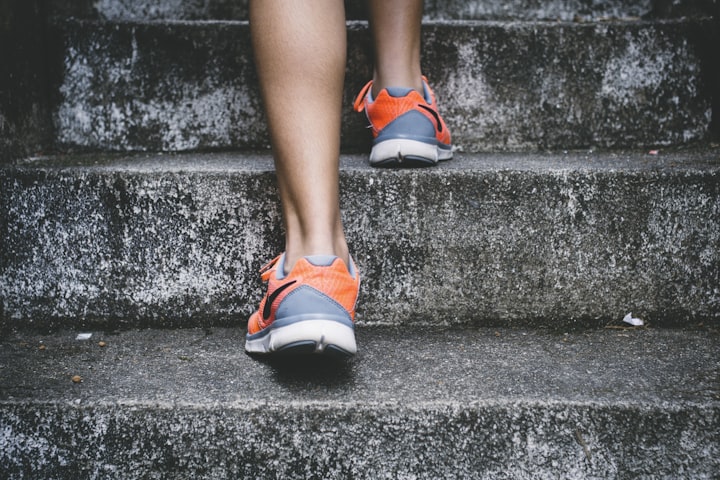
2 years ago, I would have rolled my eyes reading the title of this article. I'll admit, I very much detested any form of cardio - particularly running. Back then, I couldn't make it a mile without panting for breath, feeling muscle burn in places I didn't think possible, and just hating life.
Fast forward to now and I completed my first half marathon (13.1 miles) back in December 2020 and consider running to be one of my holy grail sports.
When I tell my friends about my newest running adventure, I'll often be met with comments like, "wow that's great! I'd love to do that, but I'm not cut out for running," or just a simple "I have always hated running and I always will. How can people enjoy such torture?"
I smile at these comments because these were the exact words I would say to my fellow running friends and myself. I'll admit, running may not be a sport that everyone enjoys, but it is certainly one that most of us are able to do. It's not that you're not built for it, you're probably just training wrong.
Disclaimer: I am not a health or exercise professional. Please consult your doctor or GP before taking up any new exercise regimen.
Myth 1: I'm not 'built' for running / I am not good at running
Solution: Put down more miles, more consistently
When you think of distance runners, who do you think of? More importantly, what do you envision they look like?
My guess is that you're probably imagining a very tall, long-legged, slim built individual. Did I guess right?
Whilst it's true that most professional long distance runners possess a physiology which is advantageous for running, the lack thereof certainly is NOT a hindrance towards you become a great runner.
The simple truth is, there really isn't such thing as being a bad runner or having the "wrong" body for it. There is only such thing as having not run enough yet.
In the beginning, you may come back from your first run and wonder how people can go farther, or specifically, how you will ever do that. I promise you, if you continue reading and begin to apply these principles, you'll be out signing up for your first 5K, 10K, half-marathon or even marathon before you know it!
Myth 2: It is such a painful exercise - I am always out of breath
Solution: Slow down
When I began running, I honestly couldn't make it down to the end of my road without being out of breath - lungs burning, legs aching and all. It was embarrassing and I almost admitted defeat.
Then, I spoke to a friend who is an avid runner and has competed in multiple distance races. She provided me with the running advice of a lifetime:
"You're going too fast."
Those four words changed the game forever.
There is a common tendency for new runners to just go out the gate without any sort of game plan or true understanding of their current cardiovascular state. Beginning at a pace which is far beyond what our body can currently endure over a long stretch of distance or time. This leads to a rapidly accelerated heart rate and production of lactic acid in our muscles very quickly. All in all, resulting in a very unenjoyable and demoralising experience.
My friend then followed up with great practical advice which ultimately led me to run a half marathon a few months later with minimal pain and fatigue.
"If you can't hold your current pace for 20 minutes straight, you're still going too fast."
I didn't realise how much internal dialogue there is when you run. But running is such a great sport as it forces us to examine how we are performing the activity while we're doing it.
In the beginning, you don't need a heart rate monitor or smart watch to help you find your pace. If anything, it is better if you don't use these tools in the beginning as you end up focusing too much on the numbers and less on the sensation.
After you have sufficiently warmed up your muscles and headed out the door, take your initial running pace and cut it by 30-40%. You'll feel ridiculously slow, and possibly a bit deflated, but if you ask yourself the simple question of:
"Can I comfortably continue running at this pace for 20 minutes?"
And BE HONEST with yourself. You will be amazed at how quickly the miles stack up effortlessly if you just answer truthfully. You'll also be amazed at the lightbulb moment when you realise that running doesn't have to be painful or exhausting, and that nobody except you cares how fast or far you go.
Additionally, in the beginning, it could be useful to run for a certain amount of time, rather than for distance. I found that setting a run time of 20 minutes rather than 3 miles was subjectively better for me because, no matter how far or fast I ran, I had accomplished something.
By running for time, you are also learning to build your aerobic capacity, by teaching your body how to keep going over a sustained period of time. Once you're comfortable with this, then by all means, begin incorporating distance goals.
However, this is not a comprehensive training guide, so I would suggest doing your research and finding what's best for you. For some, it is running for one minute and walking for one minute and for others it will be different once again. Remember, there's no one way to skin a cat.
Myth 3: I am too slow for running
Solution: Prioritise heart rate over pace
This is similar to the second myth and one I love to debunk.
As we all know, distance running is a predominantly aerobic sport. However, many of us misunderstand what this should feel like. When you feel your heart pumping out your chest, and your muscles burning, do you think this is aerobic?
The answer is NO. The sensation described above is typical of a shift to using your anaerobic state.
The difference between the two states is with regards to how your body uses energy. In aerobic conditions, you are primarily utilising oxygen to provide energy and this can be sustained over a longer period of time (2 minutes or more) - typically with a lower heart rate. In anaerobic conditions, your body switches to glucose stored in your muscles for energy releasing lactic acid (muscle burn) and this can only really be maintained for short periods of time - typically with a higher heart rate.
So, if you subjectively feel like you are "too slow" for running, the answer is, ironically, to carry on going slow. Or at least, run at a lower heart rate.
By teaching yourself to run in an aerobic state, your aerobic conditioning improves rapidly, thus meaning that over time, you will be able to run faster with a similar amount of effort to when you started!
Don't believe me? Visit Dr. Phil Maffetone's website (click here) where he gives you a more in depth exploration as to why running slow is the only truly sustainable way to become fast.
This is where a heart rate monitor may become useful, although it's not entirely necessary. I personally use a Fitbit Charge 3 (click here).
The benefit of focusing on aspects of running such as your heart rate and how slow you're going is the shift in your perception from feeling demotivated because you are not running as fast as you like, to actually making it vital to run at a slow and comfortable pace and feeling accomplished for it.
Myth 4: Running is boring
Solution: Find your 'flow' state
Now, speaking of "enjoying running", I can understand why many would laugh at the idea.
After all, who would really find moving at a steady pace along a single path a fun activity? I admit, there's not as much action as other sports such as tennis, football or basketball, but there is certainly other forms of enjoyment to be derived.
If you're like me and struggle to operate without constant stimuli, whether that's my phone or moving around and seeing people, running could be the perfect opportunity to practice mindfulness and begin finding your flow state.
"Flow" is often an elusive concept for those who haven't experienced it. Subjectively, it feels like being completely immersed in a task and focusing solely on it in an intentional, invigorating way. It's like the whole world melts around you and all there is in the world is the present moment and, in this case, your run.
So, I'll admit that the above isn't an antidote to "running is boring" by offering ways in which it can be fun. However, running can be a powerful tool to disconnect from the world and experience peacefulness - something that we can all admit we don't have enough of in our lives.
For some, running to the sound of nature helps ground them. For others, it's a podcast. For me, like many others, it's curating great playlists to run to. However, I'll caveat the music point and suggest that if you are running to music, choose it carefully. High BPM songs will tend to make us subconsciously run faster to match the beat, thus potentially kicking you out of sync with your ideal pace.
Additionally, you will be amazed at what you can discover in your local area and the world through running, literally, off the beaten track. Whilst I don't personally do this, running with others in a club can be a great way to become part of a new community and make friends for life.
So, whilst running may, in theory, be "boring", it can make your life anything but.
Final thoughts
I hope this article has been helpful as I learned these tips the hard way and know that I would have given up running a long time ago if I hadn't implemented these techniques.
If you try all of these and still think running isn't for you, then that is totally okay! I said that there wasn't one single way to skin a cat for running, but the same applies to exercise and sports more generally.
I advocate for finding movement and exercise that feels authentic and right for you. The purpose of this article was simply to debunk several common running myths in the hope that you give it a try. I know for me, it was never a matter of disliking running, it was only a case of disliking the suboptimal training habits I had adopted.
Happy running!
About the Creator
AM
Psychology graduate who speaks on wellness, mental health, The Great Resignation and relationships.






Comments
There are no comments for this story
Be the first to respond and start the conversation.